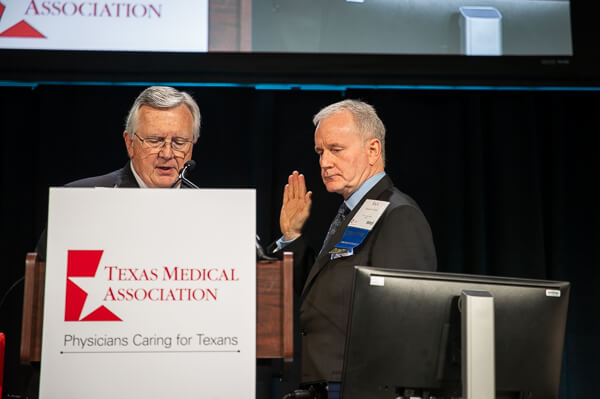
Dallas cardiologist Rick Snyder, MD, after his installation as the Texas Medical Association’s 158th president on May 20, rallied TMA member physicians to fight for the practice of medicine through tireless advocacy.
His message articulates the mission of the association as empowering physicians and the patient-physician relationship. That empowerment can only occur if physicians are active in various policy processes – as illustrated by TMA’s success in containing all bills encroaching on scope of practice in the recently ended Texas legislative session.
“I know this is almost heresy, but this is one area where we doctors need to be more like lawyers,” Dr. Snyder said. “For lawyers, no matter the specialty of law they practice, it is universally part of their culture, almost like it’s part of their DNA, to participate in advocacy and the political process.”
Physicians should follow suit, Dr. Snyder says.
“We should not and must not ever apologize for fighting for all physicians, protecting their practice viability and clinical autonomy,” he said. “And most importantly, we must empower physicians in every stage of their careers and in every practice setting. Why? Because the basic, essential principle underlying our profession is the same no matter what the model or practice setting.”
That principle – a patient-physician relationship that is independent, clinically autonomous, and preeminent – is the most important factor in improving patients’ health.
“Yet it’s not breaking news that this time-honored relationship is under continual attack by outside, third-party interest groups,” Dr. Snyder said. “More and more, they are imposing themselves on this relationship with regulations based not upon science and education, but economics and politics.”
These impositions attempt to redefine the patient-physician relationship and physicians’ role, Dr. Snyder says, and physicians “cannot allow this to happen.” Quoting 150th TMA president Tom Garcia, MD, Dr. Snyder reminded the House of Delegates, to much applause, “We are not providers; we are physicians.”
And as physicians, “we have just as much impact, if not more, on the health care our patients receive through our work in legislative chambers as we do in exam rooms and operating rooms,” he said.
In particular, Dr. Snyder urged TMA to advocate for patients’ timely access to high-quality, cost-effective health care.
“We as an organization cannot and must not be satisfied with mere coverage,” he said. “Coverage is not the same thing as access, and access to a waiting list is not the same thing as access to health care.”
He especially emphasized the quality factor of timeliness, making an apt analogy to his hometown football team, the Dallas Cowboys.
“Dak Prescott can throw a perfect-quality spiral 60 yards down the field, hitting the exact spot he intended,” Dr. Snyder said. “But if it gets there late, it’s incomplete, or worse, intercepted.”
To this end, and in light of enormous cost inefficiency in American health care, Dr. Snyder reiterated the crucial need for physician advocacy.
“While medicine is a science, and healing is an art, health care is a business – a big business,” he said. “To improve the health of all Texans, we must be at the table for every legislative and regulatory effort that impacts the key determinants of access for our patients.”
Dr. Snyder has long been active in TMA advocacy, having what Gary Floyd, MD, 157th TMA president, called unmatched hospitality, frequently opening his home to fundraising events for TEXPAC, TMA’s political action committee. These fundraisers and other lobbying events have been so common, Dr. Snyder commented his five children are now on a first-name basis with many Texas legislators and TMA lobbyists.
His understanding of the value of advocacy started young, with his father’s two-time appointment by President Reagan and President H.W. Bush to the U.S. Advisory Committee for Free Trade and the NAFTA Task Force – as well as a lost-passport incident that resulted in his mother calling two U.S. senators to resolve the issue.
The family tendency toward political participation extends to his wife, cardiologist Shelley Hall, MD, who holds many roles in clinical leadership and organized medicine, including a current three-year term as president of the Texas Chapter of the American College of Cardiology.
“My time requirement and travel as TMA president might get close to approximating hers,” Dr. Snyder joked. “Might.”
To Dr. Snyder, the presidency is both a “responsibility and honor,” and during his year of duty, he intends for TMA to “be the tip of the spear that boldly fights to empower physicians and the patient-physician relationship, everywhere, all the time.”